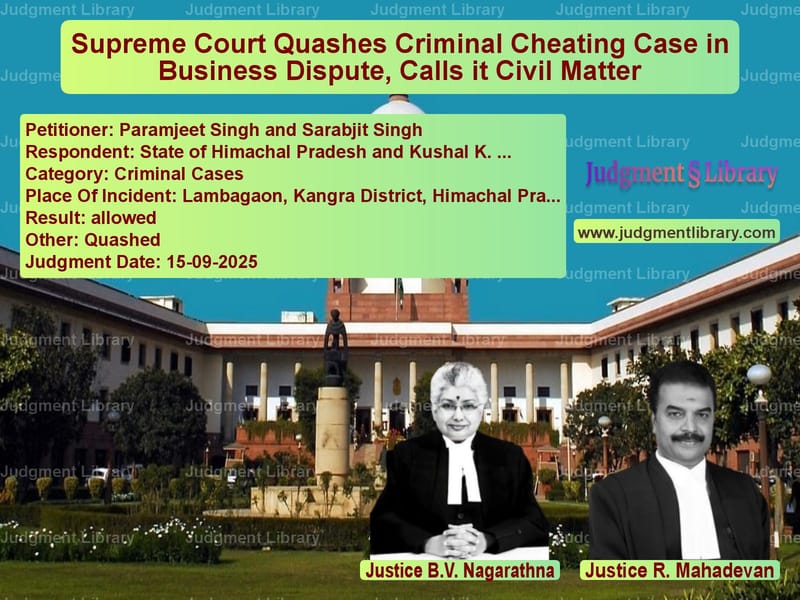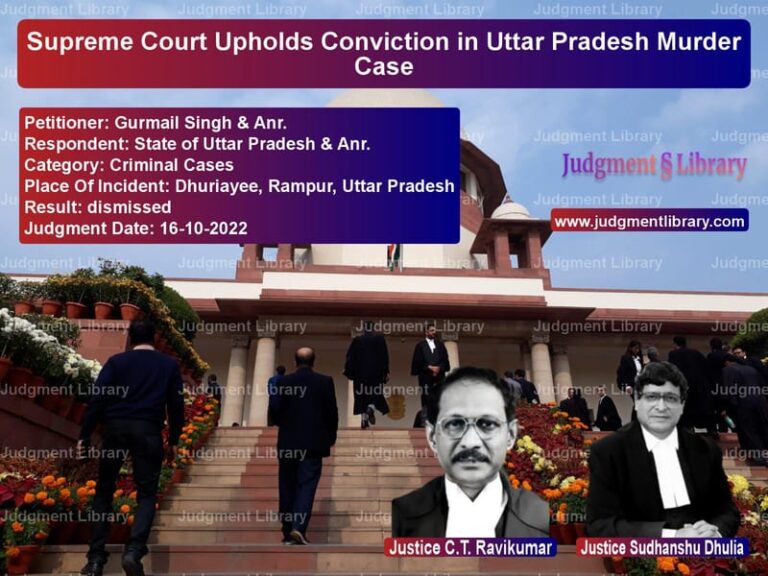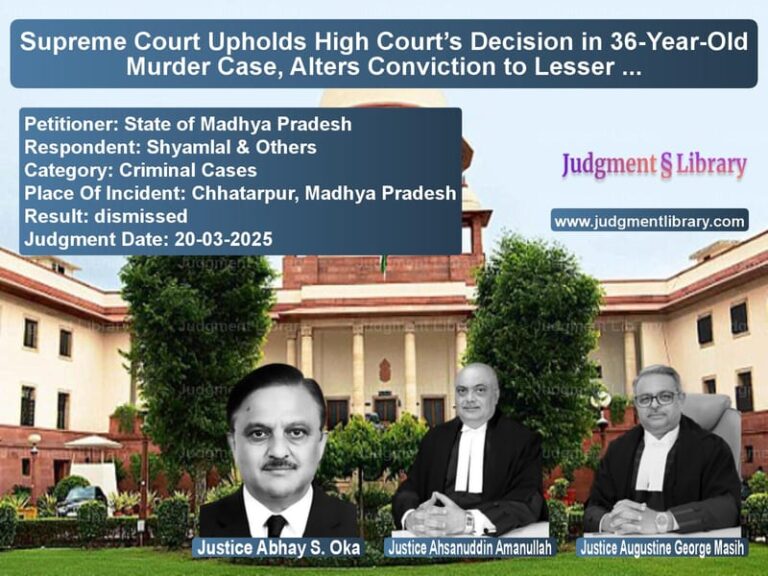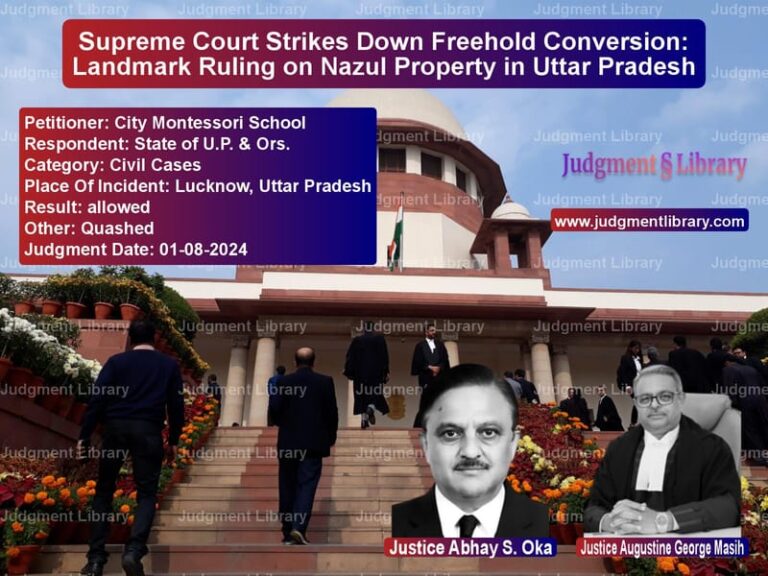Supreme Court Quashes Criminal Cheating Case in Business Dispute, Calls it Civil Matter
In a significant ruling that clarifies the distinction between criminal cheating and civil contractual disputes, the Supreme Court recently quashed criminal proceedings against two brothers running stone crushing businesses in Himachal Pradesh. The case involved Paramjeet Singh and Sarabjit Singh, who were facing charges of cheating and criminal conspiracy under Sections 420 and 120B of the Indian Penal Code. The dispute originated from a business transaction involving the sale of stone crushing machinery that allegedly did not meet agreed specifications. What makes this case particularly important is the Court’s strong stance against the misuse of criminal law to settle what are essentially civil contractual disputes.
The story begins on December 12, 2017, when M/s Soma Stone Crusher, owned by Kushal K. Rana, entered into a sale and purchase agreement with M/s Saini Engineering Works, run by Sarabjit Singh, for the purchase of a ‘sand rrulla machine’ and conveyor structures for Rs. 9,12,912. As part of this agreement, a cheque for Rs. 5,00,000 was issued as an advance payment. However, when this cheque was presented for encashment, it was returned by the bank with the remark ‘Stop Payment’. This led M/s Saini Engineering Works, represented by Paramjeet Singh, to file a complaint under Section 138 of the Negotiable Instruments Act in April 2018.
The plot thickened nearly five years later when, in February 2023, the complainant filed an FIR alleging that the machinery supplied weighed only 12 tons instead of the promised 14 tons and had an output of only 500 feet per hour instead of the expected 1000-1200 feet per hour. The complainant claimed this constituted cheating and breach of trust, causing a loss of Rs. 50 lakhs. Following investigation, a chargesheet was filed against both brothers, leading them to approach the High Court seeking quashing of the proceedings. When the High Court dismissed their petition, they approached the Supreme Court.
The Supreme Court’s analysis began with a careful examination of the essential ingredients of Section 420 IPC. The Court emphasized that “in the definition there are two separate classes of acts which the person deceived may be induced to do. In the first class of acts he may be induced fraudulently or dishonestly to deliver property to any person. The second class of acts is the doing or omitting to do anything which the person deceived would not do or omit to do if he were not so deceived. In the first class of cases, the inducement must be fraudulent or dishonest. In the second class of acts, the inducing must be intentional but need not be fraudulent or dishonest. Therefore, it is the intention which is the gist of the offence. To hold a person guilty of cheating it is necessary to show that he had a fraudulent or dishonest intention at the time of making the promise. From his mere failure to subsequently keep a promise, one cannot presume that he all along had a culpable intention to break the promise from the beginning.”
Applying these principles to the facts of the case, the Court found that the complainant had failed to make out a case satisfying the basic ingredients of the offence under Section 420 IPC. The Court stated that “We fail to understand as to how the allegations against the appellants herein could be brought within the scope and ambit of the aforesaid Section 420 IPC. On a bare perusal of the FIR as well as the charge-sheet, we do not find that the offence of cheating as defined under Section 420 IPC is made out at all and we do not find that there is any cheating and dishonest inducement to deliver any property of a valuable security involved in the instant case.”
The judgment highlighted the crucial distinction between a mere breach of contract and criminal cheating. The Court noted that “It is settled law that for establishing the offence of cheating, the complainant/respondent No.3 was required to show that the appellants had a fraudulent or dishonest intention at the time of making a promise or representation of buying the said ‘rcula set fitting’. Such a culpable intention when the promise was made cannot be presumed but has to be supported with cogent facts. In the facts of the present case, there is a clear absence of dishonest and fraudulent intention on the part of the appellants as regards the sale and purchase agreement.”
The Court further observed that “there is no allegation in the First Information Report or the chargesheet indicating either expressly or impliedly any intentional deception or fraudulent/dishonest intention on the part of the appellants right from the time of making the promise or misrepresentation. Nothing has been said on what the misrepresentations were and how the appellants intentionally deceived the complainant/ respondent No.3. Mere vague allegations by the complainant/ respondent No.3 that the appellants failed to provide a product of a particular specification and failed to replace the faulty machines do not satisfy the test of dishonest inducement to deliver a property or part with a valuable security as enshrined under Section 420 IPC.”
The five-year delay in filing the FIR also raised serious questions about the complainant’s intentions. The Court noted that “The learned counsel for the complainant/respondent No.3 has not been able to state before us the reason for the delay and this further raises suspicion about the bona fides of the complainant. The delay in lodging of the FIR, coupled with the vague allegations do not inspire the confidence of this Court to allow the criminal proceedings to continue against the appellants.”
In a significant observation about the appropriate forum for resolving such disputes, the Court stated that “The complainant had an alternative remedy of filing a civil suit claiming damages for the alleged violation of his contractual rights but a route through criminal proceedings, when no ingredient of offence is made out, cannot be permitted. Criminal law ought not become a platform for initiation of vindictive proceedings to settle personal scores and vendettas. The appellants, in our view, could not be attributed any mens rea and therefore, the allegations levelled by the prosecution against the appellants are unsustainable.”
The Court relied on its earlier decision in Vesa Holdings P. Ltd. vs. State of Kerala, which had held that “every breach of contract would not give rise to an offence of cheating but the cases of breach of contract would amount to cheating only where there was any deception played at the very inception. It was further observed that for the purpose of constituting an offence of cheating, the complainant is required to show that the accused had a fraudulent or dishonest intention at the time of making a promise or representation.”
The judgment also referenced the landmark case of State of Haryana vs. Bhajan Lal, which laid down categories where courts can exercise their inherent powers to quash criminal proceedings. The Court found that the present case fell under several of these categories, particularly where “the allegations made in the first information report or the complaint, even if they are taken at their face value and accepted in their entirety do not prima facie constitute any offence or make out a case against the Accused” and where “a criminal proceeding is manifestly attended with mala fide and/or where the proceeding is maliciously instituted with an ulterior motive for wreaking vengeance on the Accused and with a view to spite him due to private and personal grudge.”
In a broader commentary on the misuse of criminal justice machinery, the Court observed that “in recent years, the machinery of criminal justice is being misused by certain persons for their vested interests and for achieving their oblique motives and agenda. Courts have therefore to be vigilant against such tendencies and ensure that acts of omission and commission having an adverse impact on the fabric of our society must be nipped in the bud. We say so for the reason that while the complainant has made allegations against the appellants herein and a charge-sheet has also been filed, he has failed to justify the same before this Court. Such actions would create significant divisions and distrust among people, while also placing an unnecessary strain on the judicial system, particularly the criminal courts.”
The Supreme Court’s decision to quash the FIR and all subsequent proceedings reinforces several important legal principles. First, it emphasizes that criminal law should not be used as a tool for harassment or to settle civil disputes. Second, it clarifies that mere breach of contract, without evidence of fraudulent intent at the inception of the agreement, does not constitute criminal cheating. Third, it highlights the courts’ responsibility to prevent the misuse of criminal proceedings for oblique motives.
This judgment serves as an important reminder to businesses and individuals that contractual disputes should typically be resolved through civil remedies rather than criminal complaints. It also provides protection to business persons against false criminal cases filed by disgruntled parties seeking to use the threat of criminal prosecution as leverage in commercial negotiations. The Court’s strong stance against the five-year delay in filing the FIR further underscores the importance of timely action in genuine cases of criminal wrongdoing.
In conclusion, the Supreme Court’s decision represents a significant step toward preventing the misuse of criminal law in commercial disputes. By drawing a clear line between civil breaches and criminal offenses, the judgment protects business persons from harassment while ensuring that genuine cases of criminal cheating continue to be prosecuted. The Court’s message is clear: criminal courts are not alternative forums for resolving contractual disputes, and the serious consequences of criminal prosecution should be reserved for cases where clear criminal intent is established from the beginning of the transaction.
Petitioner Name: Paramjeet Singh and Sarabjit Singh.Respondent Name: State of Himachal Pradesh and Kushal K. Rana.Judgment By: Justice B.V. Nagarathna, Justice R. Mahadevan.Place Of Incident: Lambagaon, Kangra District, Himachal Pradesh.Judgment Date: 15-09-2025.Result: allowed.
Don’t miss out on the full details! Download the complete judgment in PDF format below and gain valuable insights instantly!
Download Judgment: paramjeet-singh-and-vs-state-of-himachal-pr-supreme-court-of-india-judgment-dated-15-09-2025.pdf
Directly Download Judgment: Directly download this Judgment
See all petitions in Fraud and Forgery
See all petitions in Bail and Anticipatory Bail
See all petitions in Criminal Defamation
See all petitions in Contract Disputes
See all petitions in Corporate Compliance
See all petitions in Judgment by B.V. Nagarathna
See all petitions in Judgment by R. Mahadevan
See all petitions in allowed
See all petitions in Quashed
See all petitions in supreme court of India judgments September 2025
See all petitions in 2025 judgments
See all posts in Criminal Cases Category
See all allowed petitions in Criminal Cases Category
See all Dismissed petitions in Criminal Cases Category
See all partially allowed petitions in Criminal Cases Category







